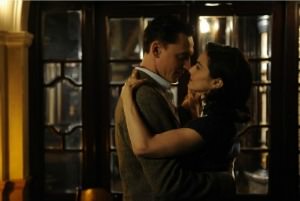‘The Deep Blue Sea’: A Forgettable Affair
It may be that, as Americans, we are the victims of a cultural disconnect. At the height of Terence Rattigan's fame, the Brits invested a good deal of admiration in his attempts to extend the reign of the carefully constructed prewar "problem" play into the postwar era. We need to see some joy from the adulterers, some sense of the world well lost for love.
Realism is very often the stylistic and philosophical default position for movies that aspire to be taken seriously by critics and the public. It follows from this rather dubious proposition that intensification of that mode will cause us to grant them an attention that they don’t really deserve and a dullness of affect that will induce restless leg syndrome in theaters everywhere. The current case in point is “The Deep Blue Sea,” which is about as bad as any soberly intended, but instructive, movie can be.
When we meet Hester (Rachel Weisz), she is attempting suicide in a particularly dismal bed-sitter in London. She is married but separated from a dull yet agreeable judge (Simon Russell Beale) and pursuing a passionate — at least on her part — affair with a feckless, unemployed pilot named Freddie Page (Tom Hiddleston) who does not fully share her enthusiasm for the wilder shore of love. He’s already had his peak lifetime experience as a fighter pilot in the Battle of Britain and is pretty much killing time for the foreseeable future.
“The Deep Blue Sea,” based on a 1952 play by Terence Rattigan — at one time a leading exponent of the well-made play — is set in postwar London, still locked in surpassing dreariness (ration books all around) and, ordinarily, it would have little claim on our attention. It has nothing pressing to say about adultery, except to indicate that it does not usually work out very well (although, of course, it often does, as many happily married former sinners live to tell us). But writer-director Terence Davies’ film version of this earnest antique, which has been well — if cautiously — received by a number of critics, is worth considering if only as an object lesson in how not to make a supposedly serious film.
Take the lighting, by cinematographer Florian Hoffmeister, who seems to have at his disposal a couple of flashlights. God forbid that some sunshine is ever let into this film, which is largely set in a particularly dismal apartment, the floral wallpaper of which is horrendously awful, though no one but members of the twitching audience seem to notice. It is, putting it mildly, not a fun place. And within its confines everyone speaks very slowly, with long pauses between sentences. Cigarettes are consumed frequently and always with portent, so much so that one sometimes wants to cry out to Weisz, “See a doctor, get a chest X-ray.”
The point is, I guess, to make us think that this is a “classic,” to make us, perhaps, re-examine Rattigan’s status as a minor, time-bound playwright, irrelevant to modern audiences. Or, maybe it is to make us think that adultery is a matter of more importance than it now is. Perhaps there’s something to that. Maybe in the Britain of 60 years ago, just before London started to swing and the bourgeois theater of Rattigan was swept away by the Angry Young Men, plays like “The Deep Blue Sea” seemed more tense, more meaningful, than they do now.
But the truth is that Hester seems more self-dramatizing than fully felt or realized, and her lover Freddie is frankly a twit and a layabout. “Don’t see what she sees in him,” one murmurs to oneself. He drinks too much, and, worse, seems mostly to want someone — specifically Hester — to take care of him. Nor does he seem to be a sexual ball of fire (though the movie is too genteel to explore that aspect of his relationship with Hester). To some degree our sympathies begin to shift to her husband. The judge is a ponderous fellow, to be sure, but he is also patient and decent in his way. And there is no question that he is ill-used. He deserves better than he gets in this film.
It may be that, as Americans, we are the victims of a cultural disconnect. At the height of Rattigan’s fame, the Brits invested a good deal of admiration in his attempts to extend the reign of the carefully constructed prewar “problem” play into the postwar era. It is nice of Davies to attempt to find a continuing significance in his work. But, stylistically, he has taken exactly the wrong course. We need to see some joy from the adulterers, some sense of the world well lost for love. More important, we need to find in this drearily told tale of a minor affair some sense — which I think was moving dimly in the playwright — that symbolically it had something to say about a confused Britain moving toward a brighter or at least different future after a long, hard time.
At the film’s end, when Hester’s fever has at last burned away and her lover is leaving for Rio and a job as a test pilot, she throws open a window and the light floods in. It amounts to an ambiguous (and entirely unearned) happy ending — something of a must in the theater of Rattigan’s day. But it’s a cheat. As is the whole movie — a doodle on the margins of an anecdote. Most movies are bad — “Nobody knows the troubles I’ve seen,” sighs the beleaguered film critic — but we usually process them with boredom and indifference. A few, however, actively annoy because they are pompous and wear their aspirations to importance — make that self-importance — on their sleeves. They think they’re something when they’re really fatuous and unnecessary, misplaced attempts to rescue through slavish sobriety artifacts of the cultural past that deserve no more than a decent burial.
Your support matters…Independent journalism is under threat and overshadowed by heavily funded mainstream media.
You can help level the playing field. Become a member.
Your tax-deductible contribution keeps us digging beneath the headlines to give you thought-provoking, investigative reporting and analysis that unearths what's really happening- without compromise.
Give today to support our courageous, independent journalists.






You need to be a supporter to comment.
There are currently no responses to this article.
Be the first to respond.